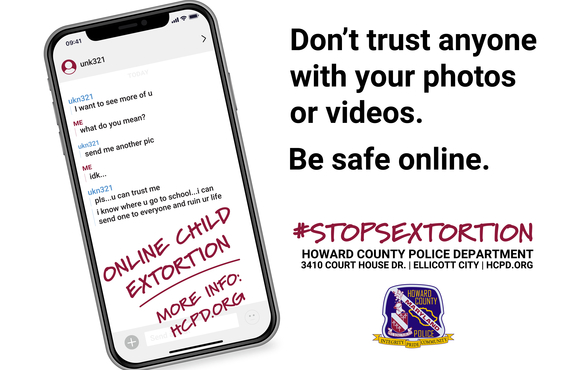With young people spending more time than ever online, law enforcement agencies around the country are warning teens and parents about a rise in online child extortion, also known as “sextortion.”
This type of crime occurs when a “new friend,” usually an adult posing as a teen, convinces a young person to provide explicit photos or videos. The offender then threatens to publish those images if the victim doesn’t share more photos or pay a large sum of money through an online payment app. In one Howard County case, the child was only 9 years old.
Young people typically believe they are communicating with someone their own age who is interested in a relationship or someone who is offering something of value. The adult can use threats, gifts, money, flattery, lies, or other methods to get a young person to produce these images.
Police are urging parents to talk to their kids. Warning signs include anyone who invites them into a private chat or asks for photos or videos via cell phone, computer or gaming console. Remind your child never to share pictures or videos, which will remain online forever if they are posted by another user.
Parents should try to monitor the computer and cell phone apps their children are using as closely as possible. Some apps store photos and videos in a way that makes them difficult for parents to find. Child predators use the internet as a convenient and anonymous way to gain access to children when they think parents aren’t looking, so it’s important to be active in monitoring your child’s use of the Internet and talk to them about how to stay safe.
If you suspect your child has been the victim of online extortion or child pornography, or you uncover anything suggesting they may have been targeted, contact the Howard County Police Department at 410-313-2200. For more information and resources, contact The Listening Place: Howard County Child Advocacy Center at 410-313-2630.
What can you do?
Recognize
Anyone who has access to the internet by any means can become a victim of sextortion. Victims come from every background and demographic, and are targeted through all internet devices.
Victims may exhibit:
- Withdrawal from family and friends
- Drop in grades or a withdrawal from typical activities
- Abnormal behaviors, such as elevated anxiety, fear, or unexplained anger
- Psychological, emotional, or physical trauma
- Self-harming ideations or actions
- Unexplained sense of urgency to "escape" to a different location to meet perpetrator's demands
Prevent
Have open discussions about the dangers of the internet and communicating with people you don't know and people you think you know.
- Warn against risky behaviors-- once an image, video, or comment is on the internet, it's there forever
- Regularly reinforce to kids they are NOT at fault; they are victims and can always talk about their concerns or suspicious interactions
- Encourage kids to talk to someone they trust about sextortion, such as a parent, teacher, coach or school counselor
Protect
Sextortion can take place through the internet, online gaming, applications and more.
- Educate yourself on computer applications, websites and online forums kids use
- Regularly supervise kids' internet-related activities
- Use basic security measures on computers to detect and avoid malware
- Keep computer software up-to-date
- Use strong passwords and do NOT share passwords with anyone except for parents or guardians
- Turn off computers and cover webcams when not in use
- Do NOT open attachments from unknown senders
Talk to your child about sextortion: 30-second conversations
- When you are online, has anyone you don't know ever tried to contact or talk to you?
- What did you do or what would you do if that happened?
- Why do you think someone would want to reach a kid online?
- You know, it's easy to pretend to be someone you are not online and not every person is a good person. Make sure you block or ignore anything that comes in from someone you do not know in real life.
- Has anyone you know ever sent a picture of themselves that got passed around school or a team or club?
- What is possible anytime you send someone a picture?
- What if that picture were embarrassing?
- Can you think about how someone could use that kind of picture against a person?
- I read an article today about kids being pressured to send images and video of their bodies to a person they met online. Have you ever heard about anything like that?
- Sometimes they were being threatened or harassed-- scary stuff.
- You know if you are ever feeling like something is going on-- online or off-- that feels scary or wrong or over your head, my first concern is going to be helping you. You can always come to me.
